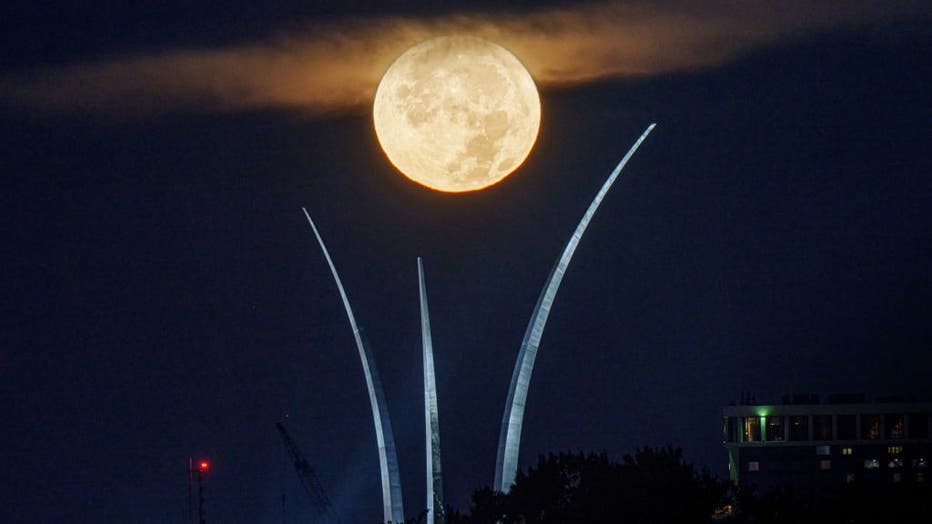Rare blue supermoon to make Bay Area appearance on Monday
Stargazers are in for a treat on Monday: a rare super blue moon is expected to be visible as early as the afternoon.
Four supermoons will grace our skies this year, but this week's will be the first act. The full moon will be a tad bit closer than usual, which will make it appear slightly bigger and brighter in the night sky.

ARLINGTON, VA - AUGUST 19: The full Super Blue Moon is centered in the spires of the U.S. Air Force Memorial early in the morning on August 19, 2024 in Arlington, Virginia. The August full moon is also known as the Sturgeon Moon. (Photo by J. David A
"I like to think of the supermoon as a good excuse to start looking at the moon more regularly," Noah Petro, project scientist for NASA's Lunar Reconnaissance Orbiter told The Associated Press.
What is a super blue moon?
More a popular term than a scientific one, a supermoon occurs when a full lunar phase syncs up with an especially close swing around Earth. This usually happens only three or four times a year and consecutively, given the moon’s constantly shifting, oval-shaped orbit.
"Some folks are calling it a ‘Blue Moon.’ Wonder why? One definition of Blue Moon is the third full Moon in a season with four full Moons. One reason some may call this a
A supermoon obviously isn’t bigger, but it can appear that way, although scientists say the difference can be barely perceptible. You may also see this full moon called a "Sturgeon Moon" which is derived from Native American history.
"The name Sturgeon Moon comes from the giant lake sturgeon of the Great Lakes and Lake Champlain; this native freshwater fish was readily caught during this part of summer and an important food staple for Native Americans who lived in the region. At one time, the lake sturgeon was quite abundant in late summer, though they are rarer today." – The Old Farmer's Almanac
When can I see the super blue moon in the Bay Area?
The full moon is expected to be visible beginning around 11:30 a.m. PST, but it will be most noticeable against the backdrop of the night sky Monday evening.
DNC kicks off to protests, students head back to school: Today News | KTVU
Protestors are expected outside of the DNC today. KTVU political reporter Greg Lee will have live updates from Chicago. Students across the Bay Area are heading back to school this week, and some are carrying backpacks full of school supplies all thanks to the generosity of their community.
Scientists point out that only the keenest observers can discern the subtle differences in the moon's size. It's easier to detect the shift in brightness — a supermoon can be 30% brighter than average.
August's supermoon kicks off a string of lunar spectacles. September’s supermoon will coincide with a partial lunar eclipse. October’s will be the year’s closest approach, and November’s will round out the year.

